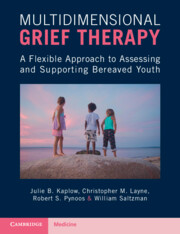Crossref Citations
This Book has been
cited by the following publications. This list is generated based on data provided by Crossref.
Hurenko, Olha
Tsybuliak, Natalia
Mytsyk, Hanna
Popova, Anastasiia
Lyndina, Yevheniia
Lopatina, Hanna
and
Suchikova, Yana
2024.
Organizational adaptation for inclusive education in universities amidst war.
Journal of Governance and Regulation,
Vol. 13,
Issue. 2, special issue,
p.
339.
Tharpe, Kimberly
2024.
Grief and Trauma Counseling Education.
p.
146.
Giang, Christopher
Alvis, Lauren
Oosterhoff, Benjamin
and
Kaplow, Julie B.
2024.
Protective Factors in the Context of Childhood Bereavement: Youth Gratitude, Future Orientation, and Purpose in Life.
OMEGA - Journal of Death and Dying,
Alvis, Lauren
Oosterhoff, Benjamin
Hoppe, Rebecca
Giang, Christopher
and
Kaplow, Julie B.
2024.
Measurement invariance of the Grief Facilitation Inventory with respect to youth gender, race, ethnicity, and age.
Death Studies,
p.
1.
Hoppe, Rebecca
Alvis, Lauren
Oosterhoff, Benjamin
and
Kaplow, Julie
2025.
Caregiver behaviors associated with positive youth development among bereaved children.
Death Studies,
Vol. 49,
Issue. 2,
p.
166.



